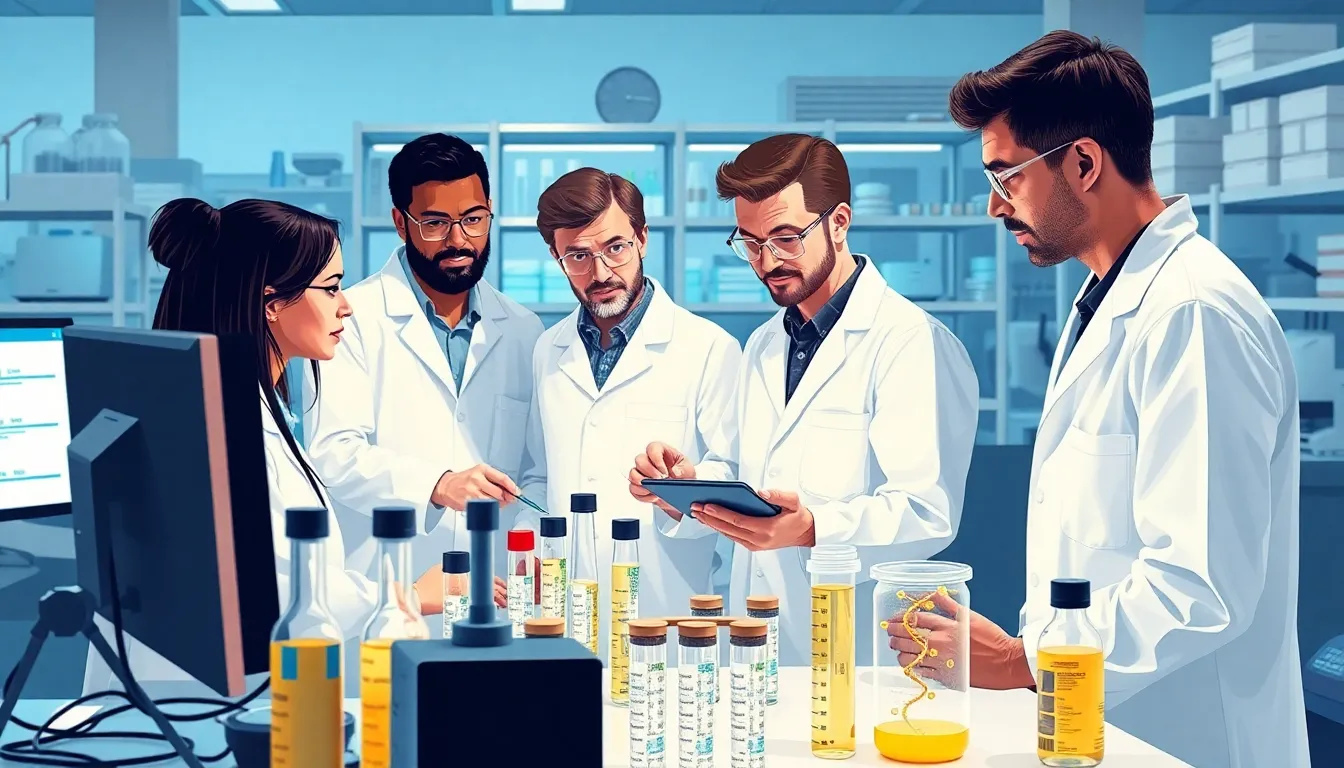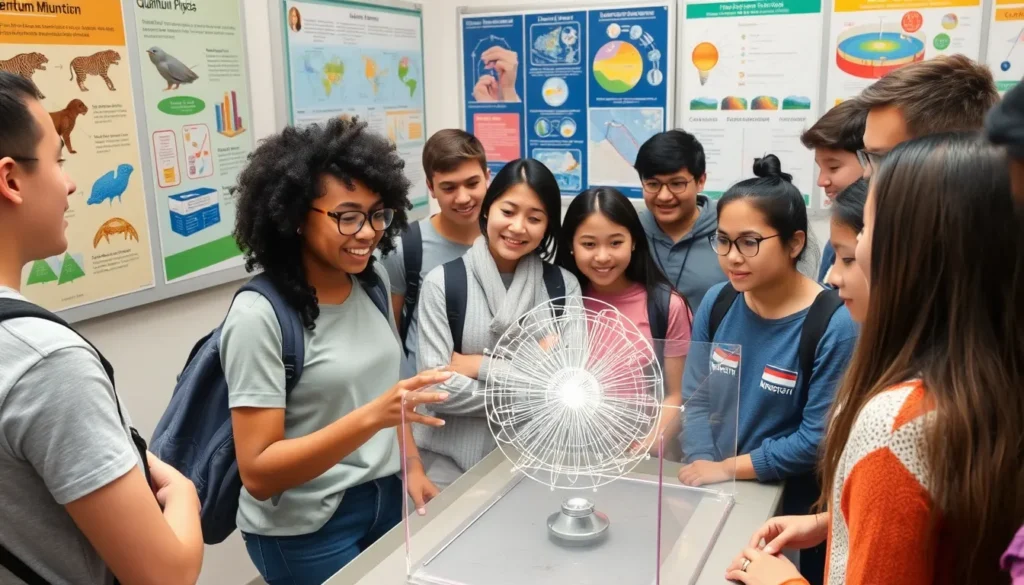In a world where smartphones can outsmart their users and fridges can order groceries, it’s clear that scientific innovations are reshaping everyday life. These groundbreaking advancements don’t just make life easier; they can also spark a little joy and a lot of curiosity. Who knew that the key to a better tomorrow could come from a lab coat and a wild imagination?
Scientific Innovations
Scientific innovations significantly impact daily living. Advanced technologies, including artificial intelligence, enhance efficiency in numerous fields. Breakthroughs in renewable energy sources contribute to sustainable practices, making them essential for addressing climate change. Innovations in medical technology, such as telemedicine, improve access to healthcare, bridging distances between patients and providers.
Smart devices play an integral role in people’s lives. Smart homes utilize devices like thermostats and security cameras, offering convenience and increased safety. App-based solutions streamline everyday activities, enabling users to manage schedules and tasks effortlessly. Robotics and automation revolutionize industries by increasing productivity and reducing labor costs.
Emerging technologies continue to reshape various sectors. The field of biotechnology presents breakthroughs in genetic engineering, opening doors for advancements in agriculture and healthcare. Quantum computing promises unprecedented computational power, impacting research and data analysis significantly.
Collaboration among scientists, engineers, and entrepreneurs drives these innovations forward. Universities and research institutions often partner with tech companies to accelerate discoveries. These collaborative efforts foster a culture of experimentation and innovation, leading to the development of groundbreaking products and services.
In essence, the landscape of scientific innovations evolves rapidly. Each advancement not only simplifies tasks but also ignites curiosity about future possibilities. Exploring these innovations opens up new avenues for creativity and problem-solving across diverse fields.
Historical Context

Scientific innovations have consistently shaped human progress. From early discoveries to modern advancements, these milestones illustrate the evolution of technology and its transformative effects.
Key Milestones in Scientific Innovations
The invention of the wheel marked a significant turning point in human history. Electricity’s harnessing in the 19th century revolutionized industries. The discovery of penicillin in 1928 by Alexander Fleming paved the way for modern medicine. Launching of the first artificial satellite, Sputnik, in 1957 initiated the space age. Breakthroughs in computing during the late 20th century expanded capabilities in virtually every field. Gene editing techniques, such as CRISPR, introduced in the 21st century, have advanced biotechnology dramatically. Each milestone built upon previous knowledge, demonstrating a cumulative approach to scientific discovery.
Impact on Society
Scientific innovations greatly influence everyday life and societal structure. Advanced medical technologies enhance healthcare access and improve patient outcomes. Renewable energy sources combat climate change while promoting sustainability. Smart devices not only provide convenience in households but also enhance security. Artificial intelligence systems streamline processes across fields, increasing productivity. Educational tools, transformed by digital technology, foster learning and accessibility for students worldwide. Societal shifts can often be traced to these innovations, highlighting their role in shaping a more efficient future.
Major Fields of Scientific Innovations
Scientific innovations span various fields, each contributing significantly to human advancement. These fields include medical innovations, technological advancements, and environmental contributions.
Medical Innovations
Medical innovations transform healthcare delivery and patient outcomes. Telemedicine enables remote consultations, reducing access barriers for patients in rural areas. Wearable health devices track vital signs and promote proactive health management. Advanced surgical techniques, like minimally invasive procedures, decrease recovery times and improve surgery success rates. Gene therapy offers potential cures for genetic disorders, highlighting the shift toward personalized medicine. Innovations in medical imaging enhance diagnostic accuracy, leading to earlier disease detection.
Technological Advancements
Technological advancements drive efficiency in everyday tasks. Smart devices streamline household activities, providing convenience and safety. Artificial intelligence systems optimize workflows across industries, enhancing productivity. Quantum computing promises significant increases in processing power, opening new possibilities for research and problem-solving. Robotics and automation minimize manual labor, improving precision and safety in manufacturing processes. The integration of the Internet of Things transforms homes into intelligent environments, increasing energy efficiency and security.
Environmental Contributions
Environmental contributions focus on sustainable solutions for a healthier planet. Renewable energy technologies like solar and wind minimize reliance on fossil fuels, reducing greenhouse gas emissions. Innovations in waste management, such as recycling and composting systems, promote circular economies. Smart agriculture practices enhance crop yields while conserving water and soil resources. Carbon capture and storage technologies mitigate climate change impacts by reducing atmospheric CO2 levels. Sustainable materials in product design reduce environmental footprints, contributing to a greener future.
Current Trends in Scientific Innovations
Scientific innovations continue to evolve rapidly, driven by emerging technologies and collaborative research efforts. These advancements shape various sectors, enhancing efficiency and improving quality of life.
Emerging Technologies
Cutting-edge technologies like biotechnology and quantum computing significantly impact fields such as healthcare and information technology. Innovations in biotechnology support breakthroughs in gene editing and personalized medicine, enabling tailored treatments for patients. Quantum computing offers unprecedented processing power, tackling complex problems impossible for traditional computers. Additionally, advancements in artificial intelligence drive automation in numerous industries, streamlining operations and enhancing productivity. Renewable energy technologies like solar panels and wind turbines reduce dependency on fossil fuels, promoting sustainable practices globally. Altogether, these emerging technologies present vast opportunities for growth and development.
Collaborative Research Efforts
Collaboration among scientists, engineers, and entrepreneurs fuels the development of groundbreaking innovations. Research partnerships across institutions maximize resources and foster interdisciplinary approaches, leading to effective problem-solving. Shared knowledge and combined expertise enhance the potential for discovery, addressing challenges faced by society. Initiatives like public-private partnerships promote investment in research projects, accelerating advancements in fields such as medicine and clean energy. Joint efforts in scientific research create an environment that nurtures creativity and drives impactful results. By working together, teams can capitalize on diverse skills and perspectives, pushing the boundaries of innovation further.
Future of Scientific Innovations
Emerging scientific innovations promise to redefine everyday life with transformative changes. Advanced technologies will enhance experiences by integrating artificial intelligence into daily tasks. Medical advancements are expected to prioritize patient-centric care through improved telehealth solutions. Telemedicine has already expanded access, and further developments will ensure more individuals receive timely interventions.
Quantum computing stands poised to revolutionize industries by solving complex problems faster than ever. Breakthroughs in this field enable unprecedented data analysis capabilities. Biotechnology, too, is charting new paths with gene editing and personalized medicine, which enhance treatment effectiveness.
Renewable energy technologies drive sustainability by optimizing energy consumption. Innovations in solar panels and wind turbines will reduce dependency on fossil fuels, fostering an eco-friendlier future. Smart grids, powered by AI and IoT, are set to improve energy distribution efficiency, thus accommodating increasing demand.
Collaboration remains key to advancing scientific innovations. Research partnerships among institutions foster diverse perspectives that contribute to effective problem-solving. Public-private initiatives can mobilize resources toward critical research projects, accelerating breakthroughs in healthcare and environmental sustainability.
Rapidly evolving trends in automation and AI will further change workforce dynamics. Adaptation to these innovations will open new job opportunities while eliminating routine tasks, allowing for more creative engagement. Overall, the trajectory of scientific innovations indicates a future rich with potential, continually shaping how societies function and thrive.
Conclusion
Scientific innovations are not just changing technology; they’re transforming lives. As advancements continue to emerge in fields like biotechnology and quantum computing, society stands on the brink of a new era filled with possibilities. These innovations enhance efficiency in healthcare, promote sustainability, and redefine everyday experiences.
Collaboration among scientists, engineers, and entrepreneurs is crucial for driving these changes forward. By fostering a culture of experimentation and embracing new ideas, the potential for groundbreaking discoveries remains limitless. The future is bright, with scientific exploration paving the way for a world that thrives on creativity and progress.



